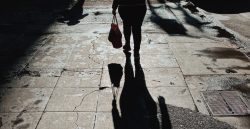Squalid work camps, 24-hour shifts, heavy surveillance, and withheld wages: these were the conditions that 500 Indian workers became trapped in after they were lured to the U.S. to repair oil rigs in the wake of Hurricane Katrina.
In his new book, The Great Escape, labor organizer Saket Soni tells the story of the workers and their fight for freedom and justice.
An American nightmare
“[The workers] were sold an American Dream but dropped into an American nightmare,” explains Soni, founder of Resilience Force, an organization that advocates for workers who rebuild infrastructure damaged by weather disasters.
The workers had travelled to the U.S. based on the promise of jobs with good conditions and green cards. They were made to pay $20,000 each for the opportunity.
What they found on arrival was starkly different to what they had been promised. They were expected to live in extremely cramped trailers—24 men to a single trailer—in a camp built above a toxic waste dump. The employer, Signal International, deducted $1,000 from their wages to cover the cost of the construction of the camp.
Twenty-four-hour shifts were the norm, and they were expected to eat frozen rice and mouldy bread. If they wanted to buy other groceries, they would be taken on chaperoned visits to Walmart: surveillance was heavy.
Instead of green cards, the workers received temporary H-2B visas that bound them to their employer, and when these visas lapsed, they lived in fear of arrest and deportation.
Marching for justice
Soni worked with the men to develop a plan to help them escape and access justice. By bribing guards with cigars and alcohol, the workers were able to leave one by one late at night. They gathered in a local hotel for a meeting and discussed their next steps.
The men then marched back to the company, chanting, and threw their hardhats over the gates as a symbol of their collective decision to leave. Before the police arrived, they boarded buses headed to New Orleans.
Eventually, the men walked from New Orleans to Washinton, D.C., to call for remedy from the Department of Justice. Marching along highways through Mississippi, Alabama, and Georgia, they held signs with slogans like “Dignity”.
After a long legal battle, the jury finally found the company, the attorney in New Orleans and the Indian labor recruiter guilty of a series of crimes including forced labor, trafficking, and fraud. The plaintiffs received millions in compensation.
Call for greater protections from exploitation
When natural disasters strike in the U.S., migrant workers are often key players in rebuilding and recovery efforts. Despite carrying out essential work, many of them cannot access visas, leaving them at risk of exploitation at the hands of unscrupulous employers.
Soni explains on an NPR podcast:
What I’ve seen is that across the board, immigrant workers are afraid to come forward and report abuse […] The workers who do rebuilding and repair work after climate disasters are living in their cars. They’re waking up in the morning in Home Depot parking lots. They’re climbing up on roofs and doing extraordinarily difficult work in the hot sun. […] And they face many of the same issues that immigrant workers in the U.S. face across the board, you know, abuse, exploitation, nonpayment of wages and conditions that in some cases do rise to the legal level of forced labor.
The Freedom United community is demanding that governments around the world, including the U.S., protect these essential workers from exploitation by passing immigration legislation that prioritizes human rights and upholds international standards. Join our campaign today: sign the petition.







Freedom United is interested in hearing from our community and welcomes relevant, informed comments, advice, and insights that advance the conversation around our campaigns and advocacy. We value inclusivity and respect within our community. To be approved, your comments should be civil.
The kafala “system” in the USA…what happened to us humans? Is this in our genome? You know,self survival,at other expense,human or environmental? Do you learn this greed by being/climbing to wealth and power? A sad indictment…it’s nothing new l guess,ancient slavery,by another name…survival is in our DNA,but achieving it,went/has gone wrong…